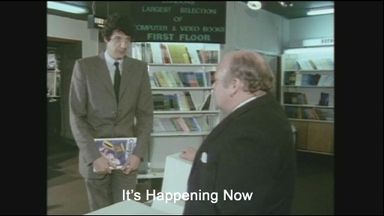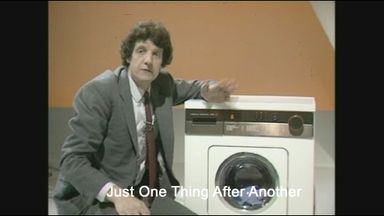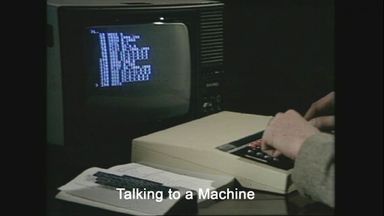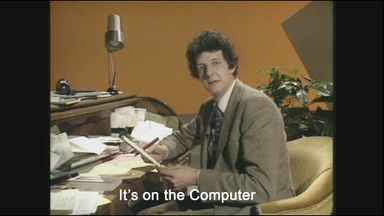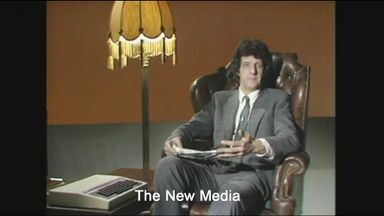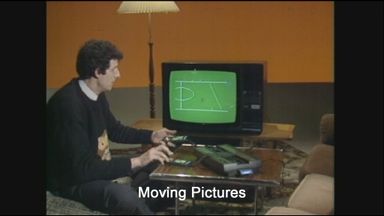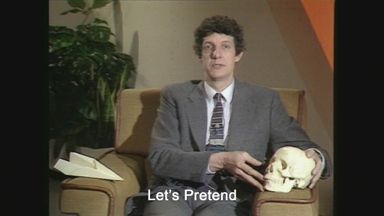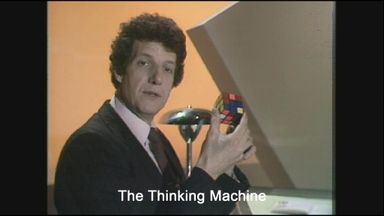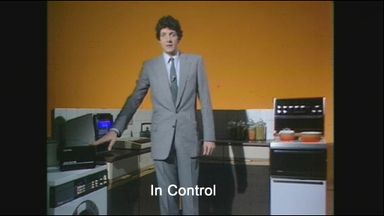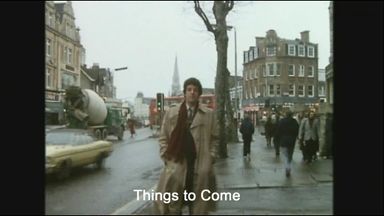The Computer Programme
10. Things to Come
Clips from this programme
What can we expect of things to come?
Duration: 00:37The world has changed from an agricultural economy via mechanisation after the industrial revolution through to today's automated environment. But what might be coming next?
Duration: 05:34A futuristic vision of a completely new way of farming: an american prospect of a 'cookie' field growing all the ingredients for making biscuits, harvesting them together and even packaging the product
Duration: 03:21Today a computer controlled dairy farm system monitors individual cows to look for genetic weakness. The owners don't need to know their animals as much as before: their needs are catered for by the computer
Duration: 02:28Does 'money' really exist or is it an abstract concept - just information that can be handled automatically? Rex Malik follows the early 1980s outdated paper chase involved in paying a domestic energy bill as it is passed between clearing banks and on to the utilities company. Many steps involving jobs which will soon be automated out of existence. He predicts the profound changes likely as these processes are automated more and more. Paper shuffling in dehumanising jobs must be on the way out
Duration: 08:05With the automation of much financial business, many jobs will go. Charles Lett, Chairman of The Advanced Computer Techniques Corporation in New York predicts that most tasks can be done better by computers and that this will and should happen. He predicts - provocatively - a brave new creative world.
Duration: 01:44The story of the successful blacksmith who invents a better mousetrap, employs others to sell and market it and endlessly searches for even better mousetraps is a parable for the structure of modern multinational business. The better Mousetrap Corporation employs many people who don't understand or even know about mousetraps.
Duration: 02:33Rex Malik (the series advisor) comments that the modern corporate world is built on silicon - on sand - with all that that implies. And Paul Kriwaczek (the series producer) ends by asking what should happen if machines can do things better than people. Do we abandon the protestant work ethic and create the 'leisure' society? Maybe we need better ideas. Questions about the implications of the use of computers are for another time. Paul - a thoughtful, talented producer died in 2011
Duration: 00:59The Computer Programme
1. It's Happening Now
First broadcast: 11th January 1982
Duration 24:51
"Don't expect the computer revolution to happen tomorrow, it's going on all around us." Chris Serle, Ian McNaught-Davis and Gill Nevill begin their exploration of the world of Information Science and ask: 'What can computers do for us? Who is using them now, and where is this technology likely to lead?' Director: FRANK ASH Director: MATT BONEY Producer: PAUL KRIWACZEK
2. Just One Thing After Another
First broadcast: 18th January 1982
Duration 24:53
CHRIS SERLE, IAN MCNAUGHT-DAVIS and Gill Nevill, continue their exploration of the world of information science. Even the most elaborate and sophisticated computer programs are made up of only a few types of relatively simple steps. The art of computer programming lies in combining these into ever more complex combinations. Directors FRANK ASH, MATT BONEY Producer PAUL KRIWACZEK
3. Talking to a Machine
First broadcast: 25th January 1982
Duration 24:23
CHRIS SERLE, IAN MCNAUGHT-DAVIS and GILL NEVILL continue their exploration of the world of information science. The difficulty of communicating with computers is that they are machines and we are people. The common language we share can turn out to be a lot more like English than we might expect. Directors FRANK ASH, MATT BONEY Producer PAUL KRIWACZEK
4. It's on the Computer
First broadcast: 1st February 1982
Duration 24:39
CHRIS SERLE, IAN MCNAUGHT-DAVIS and GILL NEVILL continue their exploration of the world of information science. Storing information is what the great majority of computers are used for. But how much can they hold, and how can the stored information be easily retrieved? Director MATT BONEY Producer PAUL KRIWACZEK
5. The New Media
First broadcast: 8th February 1982
Duration 24:12
CHRIS SERLE, IAN MCNAUGHT-DAVIS and GILL NEVILL continue their exploration of the world of Information Science. 5: The New Media : The greatest public impact of information technology is likely to be in the provision of new means of communication. Directors FRANK ASH, MATT BONET Producer PAUL KRIWACZEK
6. Moving Pictures
First broadcast: 15th February 1982
Duration 24:37
CHRIS SERLE, IAN MCNAUGHT-DAVIS and GILL NEVILL continue their exploration of the world of information science. For many people games, with their elaborate visual displays, are the most commonly encountered aspect of computer technology. But generating sound and pictures from a computer is no different to manipulating text. Director: MATT BONEY Director: Frank Ash Producer: PAUL KRIWACZEK
7. Let's Pretend
First broadcast: 22nd February 1982
Duration 24:32
CHRIS SERLE, IAN MCNAUGHT-DAVIS and GILL NEVILL continue their exploration of the world of information science. 7: Let's Pretend: Training space-shuttle pilots, or testing bridges to destruction, is normally too costly or too dangerous to do on the real thing. But by giving a computer an exact description of how a complicated system behaves, it can mimic anything from the British economy to the world's weather. Directors FRANK ASH, MATT BONEY Producer PAUL KRIWACZEK
8. The Thinking Machine
First broadcast: 1st March 1982
Duration 24:30
CHRIS SERLE, IAN MCNAUGHT-DAVIS and GILL NEVILL continue their exploration of the world of information science 8: The Thinking Machine: In spite of years of investment in the development of intelligent machines, computer scientists are still a long way from equalling human thought, let alone surpassing it. The future, however, may yet present us with great surprises. Directors MATT BONEY, FRANK ASH Producer PAUL KRIWACZEK
9. In Control
First broadcast: 8th March 1982
Duration 24:34
CHRIS SERLE, IAN MCNAUGHT-DAVIS, GILL NEVILL 9: In Control: By far the greatest number of computers with which we will come into contact in the future will be invisible. They will be the microprocessors built into many of our domestic appliances, replacing many of the mechanical systems that we use today, with greatly improved reliability, flexibility, and at low cost. Directors FRANK ASH, MATT BONEY Producer PAUL KRIWACZEK
10. Things to Come
First broadcast: 15th March 1982
Duration 24:17
CHRIS SERLE, IAN MCNAUGHT-DAVIS and GILL NEVILL continue their exploration of the world of information science. Things to Come: Information technology has the power to change the face of our society completely by taking over the work of a large majority of the population. But will this be allowed to happen, and which aspects of our economic life are most likely to be affected? Directors MATT BONEY, FRANK ASH Producer PAUL KRIWACZEK
Now playing











